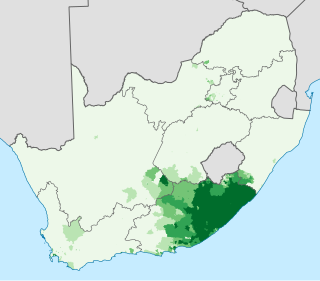
Xhosa, formerly spelled Xosa and also known by its local name isiXhosa, is a Nguni language and one of the official languages of South Africa and Zimbabwe. Xhosa is spoken as a first language by approximately 10 million people and as a second language by another 10 million, mostly in South Africa, particularly in Eastern Cape, Western Cape, Northern Cape and Gauteng, and also in parts of Zimbabwe and Lesotho. It has perhaps the heaviest functional load of click consonants in a Bantu language, with one count finding that 10% of basic vocabulary items contained a click.
The Nguni languages are a group of closely related Bantu languages spoken in southern Africa by the Nguni people. Nguni languages include Xhosa, Hlubi, Zulu, Ndebele, and Swati. The appellation "Nguni" derives from the Nguni cattle type. Ngoni is an older, or a shifted, variant.
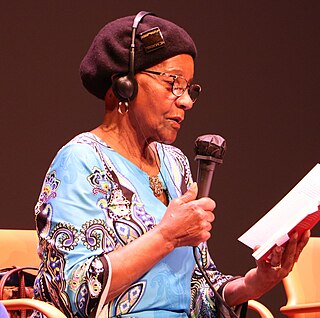
Sindiwe Magona is a South African writer.

At least thirty-five languages indigenous to South Africa are spoken in the Republic, twelve of which are official languages of South Africa: Ndebele, Pedi, Sotho, South African Sign Language, Swazi, Tsonga, Tswana, Venda, Xhosa, Zulu, Afrikaans and English, which is the primary language used in parliamentary and state discourse, though all official languages are equal in legal status. In addition, South African Sign Language was recognised as the twelfth official language of South Africa by the National Assembly on 3 May 2023. Unofficial languages are protected under the Constitution of South Africa, though few are mentioned by any name.
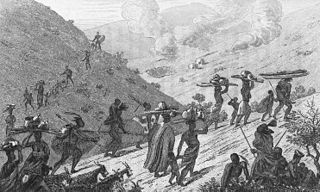
The amaMfengu was a reference of Xhosa clans whose ancestors were refugees that fled from the Mfecane in the early-mid 19th century to seek land and protection from the Xhosa. These refugees were assimilated into the Xhosa nation and were officially recognized by the then king, Hintsa. The term derives from the Xhosa verb "ukumfenguza" which means to wander about seeking service.
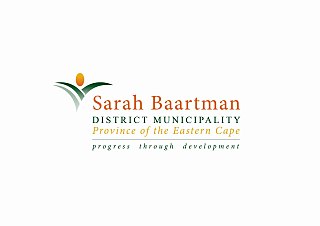
The Sarah Baartman District Municipality, formerly the Cacadu District Municipality, is situated in the western part of the Eastern Cape province of South Africa, covering an area of 58,242 square kilometres. The area of the district municipality includes seven local municipalities. The seat is the city of Gqeberha, although Gqeberha is not itself in the district. As of 2011, the languages most spoken among the 388,201 inhabitants were isiXhosa and Afrikaans. The district code is DC10.
The following is a list of timekeeping terminology in the isiXhosa language.
Mhlobo Wabantwana Jadezweni is a South African academic and author. He has degrees from the University of Fort Hare and Stellenbosch University. He has been attached to the Department of African Languages at Stellenbosch University since 1983, where he teaches Xhosa literature and language, and studies isiXhosa poetry. He has served on various Xhosa language boards since 1984 and is chairperson of the isiXhosa Lexicography Unit at Fort Hare.
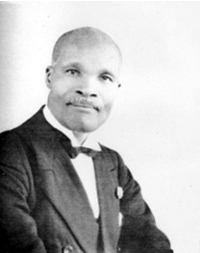
Samuel Edward Krune Mqhayi was a Xhosa dramatist, essayist, critic, novelist, historian, biographer, translator and poet whose works are regarded as instrumental in standardising the grammar of isiXhosa and preserving the language in the 20th century.

The Xhosa people, or Xhosa-speaking people are a Bantu ethnic group whose traditional homeland is primarily the Eastern Cape Province of South Africa. They received the name Xhosa from the Khoi, meaning the violent angry people. Southern Africa IsiXhosa language.
The Cape Academy of Mathematics, Science and Technology, often abbreviated to "Cape Academy", is a co-educational public boarding school, situated in the Constantia Valley of Cape Town, South Africa. The Cape Academy was founded in 2004 by the Western Cape Education Department to offer quality instruction in the sciences to students from previously disadvantaged backgrounds, as part of the government's strategy to fill the skills gap present in South Africa.

Myrsine melanophloeos, commonly known as Cape beech, Kaapse boekenhout (Afrikaans), isiCalabi (Zulu) or isiQwane sehlati (Xhosa) is a dense evergreen tree that is native to the afromontane forests of Africa, ranging from Nigeria and Sudan to South Africa. Outside forests they are also commonly encountered along stream banks and in gullies.

This article focuses on the history of 19th century Xhosa language newspapers in South Africa.
Bhaca, or IsiBhaca (Baca) is a Bantu language of South Africa. Traditionally considered a dialect of Swati, it is closer to Xhosa, Phuthi and Zulu. It is spoken southeast of Lesotho, where Sotho, Xhosa and Zulu meet, mainly around Mount Frere, Mzimkhulu, and to a lesser extent in Mount Ayliff, Matatiele, Harding, Bulwer, Underberg, Highflats, Umzinto, Umzumbe and Ixopo.
Pinelands High School is a public English medium co-educational high school situated in Forest Drive, Pinelands in the city of Cape Town in the Western Cape province of South Africa. It was opened in July 1952 and the founding principal was Jack Kent. The school now enrolls approximately 980 students.
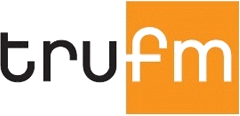
Tru FM is a South African commercial radio station based in the Eastern Cape. The station is unique in the SABC PBS stable as it is the only station primarily targeting the youth with two languages of broadcast, IsiXhosa and English.
The Revd Professor Peter Tshobisa Mtuze is a poet, priest and academic. He worked as an interpreter in the law courts of the old South Africa, a radio announcer, a salesperson for a publishing company, a civil servant in the homeland government structures, a lecturer at Unisa, an Editor in Chief of the Greater Dictionary of isiXhosa at Fort Hare, before joining Rhodes University as Professor and Head of the isiXhosa Department.
The Iziko Museums of Cape Town — an amalgamation of 12 national museums located near the Cape Town city centre. Iziko museums spheres – natural history, social history and arts.
The Uhadi, a musical bow, is a traditional Southern African Xhosa musical instrument. It is a large unembraced musical bow which is attached to a resonator and played by percussion. The length of the string bow ranges from 115 to 130 centimeters. Similar musical bows in Southern Africa include the ‘’thomo’’ in Sotho music and the ‘’ugubhu’’ in Zulu music.
Ringo Madlingozi is a South African singer, songwriter, record producer and a Member of the National Assembly of South Africa. Madlingozi rose to fame when he and his band Peto won the Shell Road to Fame contest in 1986. He later formed a group called Gecko Moon with Alan Cameron, a fellow Peto member.










